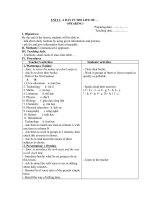Giáo án Tiếng Anh 10 Unit 1: A day in the life of…
Bạn đang xem bản rút gọn của tài liệu. Xem và tải ngay bản đầy đủ của tài liệu tại đây (139.38 KB, 13 trang )
Giáo án English 10
Part A: READING (TCT-02)
• Aims
Reading a passage about a farmer’s daily routine.
• Objectives
- To train students in guessing meaning in context, understanding the whole
passage and scanning for specific information.
- To remind students of words often used to talk about daily routines.
• Methods and materials
Integrated, mainly communicative, textbook, chart.
• Anticipated problems
Students do not understand the use of present simple tense in the passage.
• Procedures
Time
Teacher’s activities - Stages
5’
Sts’ activities – possible answer
Warm up
T shows sts the picture in the Sts look at the picture and answer
textbook page 12 to lead in.
T’s question.
T: Who do you think he is?
What do you think he is doing?
He’s a farmer.
He’s with a buffalo.
What do you think he often does
He often plants rice, raises
during his day?
chickens, ducks…
10’
Presentation
T gives sts some new words needed
to understand the passage
- get up (v) – translation
Giáo án English 10
- lead (v) – action – translation
Sts write down the new words and
expressions. Give more examples.
- buffalo (n) – picture
- It take s.o – (time) – to Inf
(example - translation)
- plough (v) – translation
- harrow (v) – translation
- plot of land – translation
- take a rest – situation – translation
- transplant (v) describe the action in
English.
25’
Practice
T asks sts to read the passage and do Sts do the task
the task 1, 2, and 3.
* Task 1:
(synonyms)
multiple
choice
T: explain more about other choices.
* 1. goes off – rings
2. to get ready – to prepare
3. chat – talk in a friendly way.
4. contented with – satisfied with
* Task 2:
answer questions in textbook page 16
* 1. He’s a farmer.
2. He gets up at 4:30 and then he
goes to the kitchen to boil some
water for his morning tea.
3. He ploughs and harrows his plot
of land, drinks tea with his fellow
peasants and smokes local tobacco
Giáo án English 10
during his break.
4. They go to the field again. Mr.
Vy pumps water into it and Mrs.
Tuyet does the transplanting.
* Sts: fill in the 3rd column
* Task 3: fill in the chart
In the morning
At
Activities
4:30
Mr. Vy gets up, goes to boil water,
drinks tea, has breakfast, leads the
buffalo to the field.
leaves the house
5:15
5:30
arrives in the field, ploughs and
harrows his plot of land .
take the a short rest.
In the afternoon
7:45
goes home.
10:30
has lunch with his family
11:30
Mr. Vy and Mrs. Tuyet go to the field
again: repairing the banks, pumping
water inside and transplanting.
2:30
finish work.
have dinner.
6:30 pm
watch TV, go to bed or visit and chat
Giáo án English 10
7:30 pm
with neighbors.
After dinner
5’
Consolidation
T goes over the way used to describe Sts:
daily routines.
* Supplement after piloting the plan:
Part B: SPEAKING (TCT-03)
• Aims
To practise talking about daily routines.
• Objectives
- To let students practice asking and giving information from a timetable.
- To get accustomed to the use of present simple tense to talk about daily
routines.
• Methods and materials
Integrated, mainly communicative.
• Anticipated problems
Students may not know some words for specific pictures. Textbook.
• Procedures
Time
Teacher’s activities - Stages
5’
Sts’ activities - possible answer
Warm up
T asks sts some questions.
Sts answer the questions.
Do you often do morning exercises? (answer may vary)
Giáo án English 10
What time do you often do morning
exercises?
5’
Presentation
T gives sts key structures for talking Sts make some examples.
about a timetable and daily routines.
What time do/does .V. ?
.S. often/usually .V. at ...
30’
Practice
T asks sts to do task 1, 2, 3
10’
* Task 1:
* Sts practice the task in pairs.
asking and answering with a
timetable.
10’
* Task 2:
talk about Quan’s activities.
*Sts practice individually for public
check.
T gives some extra words.
ride to the stadium
ride home
take/ have a bath
10’
* Task 3:
Talking about sts’ own daily routine.
T asks sts to get information from
their partner and report to the whole
class.
5’
Consolidation
* Sts practice in pairs then one will
report his partner’s daily routines.
Giáo án English 10
Go over the ways of asking and
giving information from a table and
talking about daily routine.
* Supplement after piloting the plan:
Part C: LISTENING (TCT-04)
• Aims
To practice listening about a specific person’s daily routines.
• Objectives
- Giving sts more practice in catching some important words for numbering
pictures and listening for more details to decide on True - False statements.
• Methods and materials
Integrated, mainly communicative skills, pictures in textbook.
• Anticipated problems
Students may not know some words for specific pictures.
• Procedures
Time
Teacher’s activities - Stages
5’
Sts’ activities - possible answer
Warm up
T asks sts the questions given in the Sts answer the questions.
textbook.
5’
Presentation
T supplies sts with the sound form, Sts write down the words and
spelling form and meaning of some remember their sound forms.
new words.
35’
Practice
Giáo án English 10
10’
* Task 1:
T asks sts to think about the words
they may hear from the six pictures.
15’
* Sts listen and number the picture
according to what they listen to.
1.e
4.c
2.f
5.d
3.a
6.b
* Task 2:
Deciding True or False
T asks sts to pay attention to words Sts listen and check if they are true/
false, why?
that may be wrong.
1. Mr Lam lives in district 1.
1. F (not mentioned) (5)
2. Mr Lam usually gets up early.
2. T
3. After he gets up, he rides his cycle 3. F (he took a passenger from Dist 5
to Dist 1)
from District 5 to District 1.
4. Mr Lam’s first passengers are 2 4. F (an old man)
pupils.
5. F (at a food stall)
5. Mr Lam has lunch at home with
6. F (take a rest and continue his
his family.
afternoon’s work)
6. After lunch, Mr Lam immediately
goes back to work.
After listening - Consolidation
T asks class to talk about Mr Lam’s
Sts ask and answer using cues
activities with cues
Name (what)
Mr Lam
Occupation (what)
A cycle driver
Giáo án English 10
Start work (what time)
6:00 a.m
Passengers (who)
an old man, a lady, 2 pupils
Lunch (what time)
at twelve
(where)
at a food stall
Rest (where, Yes/no)
under a tree, short rest
* Supplement after piloting the plan:
Part D: WRITING (TCT-05)
• Aims
To let students practice writing a narrative.
• Objectives
- To help make students acquainted with the stages of a narrative.
- To remind students of the use of last Simple tense and then in a narrative.
• Methods and materials
Integrated, mainly communicative skills. Textbook.
• Anticipated problems
• Procedures
Time
Teacher’s activities - Stages
5’
Sts’ activities - possible answer
Warm up
T asks some sts to answer question:
- What did you do yesterday?
- How did you do that?
Sts answer T’s questions.
Giáo án English 10
5’
Presentation
T presents sts the definition of Sts listen and imagine the form of a
‘event’, ‘climax’ and ‘conclusion’ narrative.
and remind sts of the use of Past
simple tense in a narrative
- event: sự kiện
- climax: đỉnh điểm
- conclusion: kết luận
30’
Practice
5’
* Task 1: listen verbs used in the * Sts do the task individually then
past form and connectors.
compare their answers.
T explains more about connectors
- at first
Verb: stared, was arrived, began,
screamed,
seemed,
announced,
realized, were landed, took off, got,
thought, felt, were told
- a few minutes/ one hour later
* Sts do the task in groups
* Task 2: Identifying ...
-Events: got on the plane
- when/ just when
10’
-Events: some
narrative.
details
of
the
the plane took off
the plane began to shake
the plane seemed to dip
people screamed in panic
-Climax: they thought they had a
few minutes to live.
-Climax: the most important, -Conclusion: “a few minutes later ...
safely”
thrilling, interesting detail.
-Conclusion: the end of the story, Sts report their groups’ result.
Giáo án English 10
narrative.
* Task 3:
15’
Writing a narrative about a hotel fire Sts write their narratives then red
using prompts.
them.
T asks sts to write individually then (sts narratives may vary)
read their narratives for public
check.
(provide help anytime needed)
5’
Consolidation
T goes over the form of a narrative
and the use of the past simple tense
in it and in other cases.
* Supplement after piloting the plan:
Part E: LANGUAGE FOCUS (TCT-06)
• Aims
To provide students with phonetic practice and remind them of some grammar
points.
• Objectives
- To help students distinguish /1/ and /i:/.
- To recall the usage of present simple, adv of frequency and past simple.
• Methods and materials
Integrated, mainly communicative skills. Textbook.
Giáo án English 10
• Anticipated problems
• Procedures
Time
Teacher’s activities - Stages
3’
Sts’ activities - possible answer
Warm up
T asks sts to pronounce ‘live’ - Sts pronounce the words.
‘leave’ and identify the difference
Pronunciation
2’
Presentation
T tells the difference between /1/
and /i:/ and pronounce examples.
7’
Sts practice the examples.
Practice
T asks sts to pronounce the
sentences.
Sts say the sentences correctly.
Grammar and vocabulary
8’
Presentation
T reminds sts of the usage and form Sts supply the usage, form of the
of present simple and past simple tenses and meaning of the adv of
tense together with some adv of frequency supplied by T.
frequency often used in present
simple tense.
Practice
* Exercise 1: Simple Present tense
8’
T asks sts to fill in the blanks with
the verbs in the box in present
simple tense.
* Sts do the task
1. is
5. catch
9. give up
2. fish
6. am
10. says
3. worry
7. catch
11.
Giáo án English 10
* Exercise 2:
4. are
8. go
Adding adv of frequency
5’
realize
12. am
T explains more about meaning of
some new adv and position.
* Sts complete the sentences by
- as a rule _ at the beginning of adding adv of frequency.
sentences (translation)
(Sts’ answer may vary)
normally/
occasionally
(translation)
* Exercise 3:
Supplying past simple form
* Sts do the task.
8’
4’
Consolidation
T goes over the difference
between /1/ and /i:/ and the use of
Present/ Past Simple tense with
advs of frequency.
1. was done
10. crept
2. cooked
11. slept
3. were
12. woke
4. smelt
13. was
5. told
14. leapt
6. sang
15. hurried
7. began
16. found
8. felt
17. wound
9. put out
18. flowed
Giáo án English 10
* Supplement after piloting the plan:









